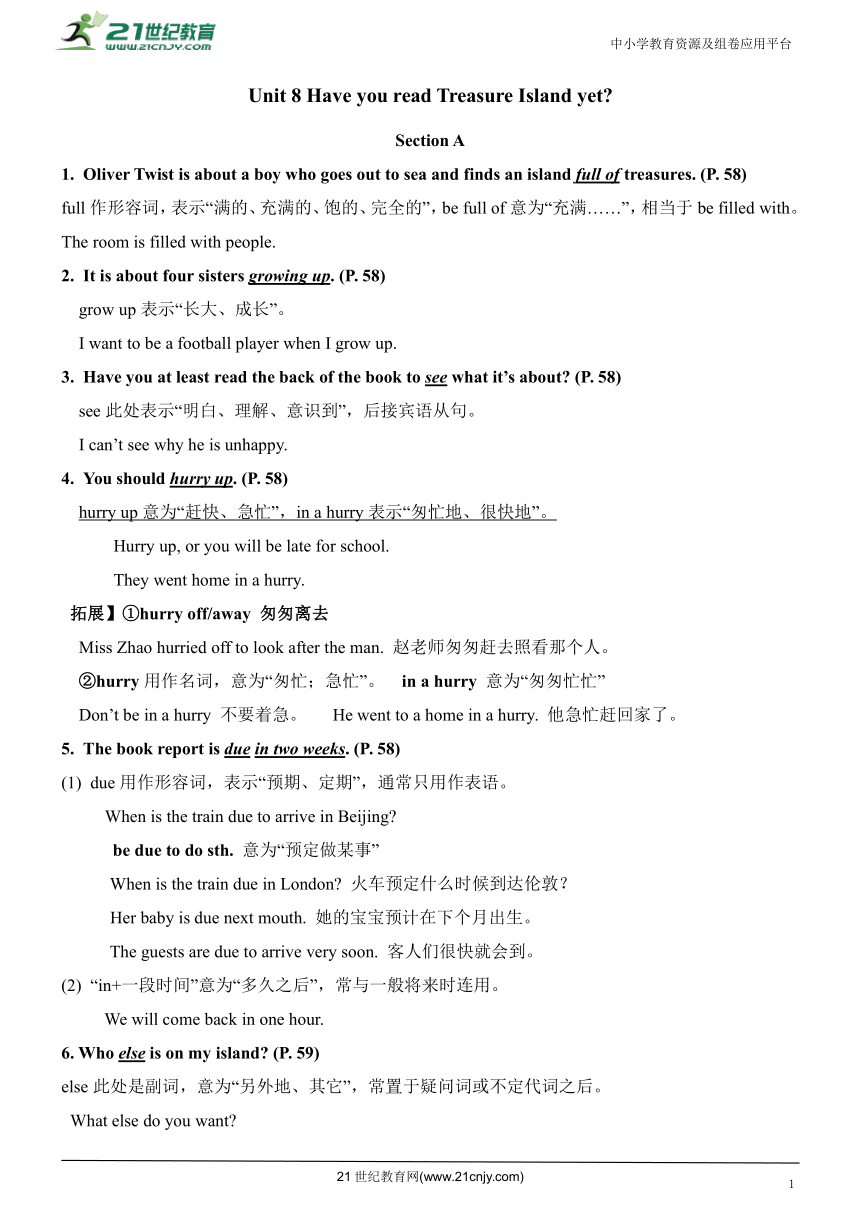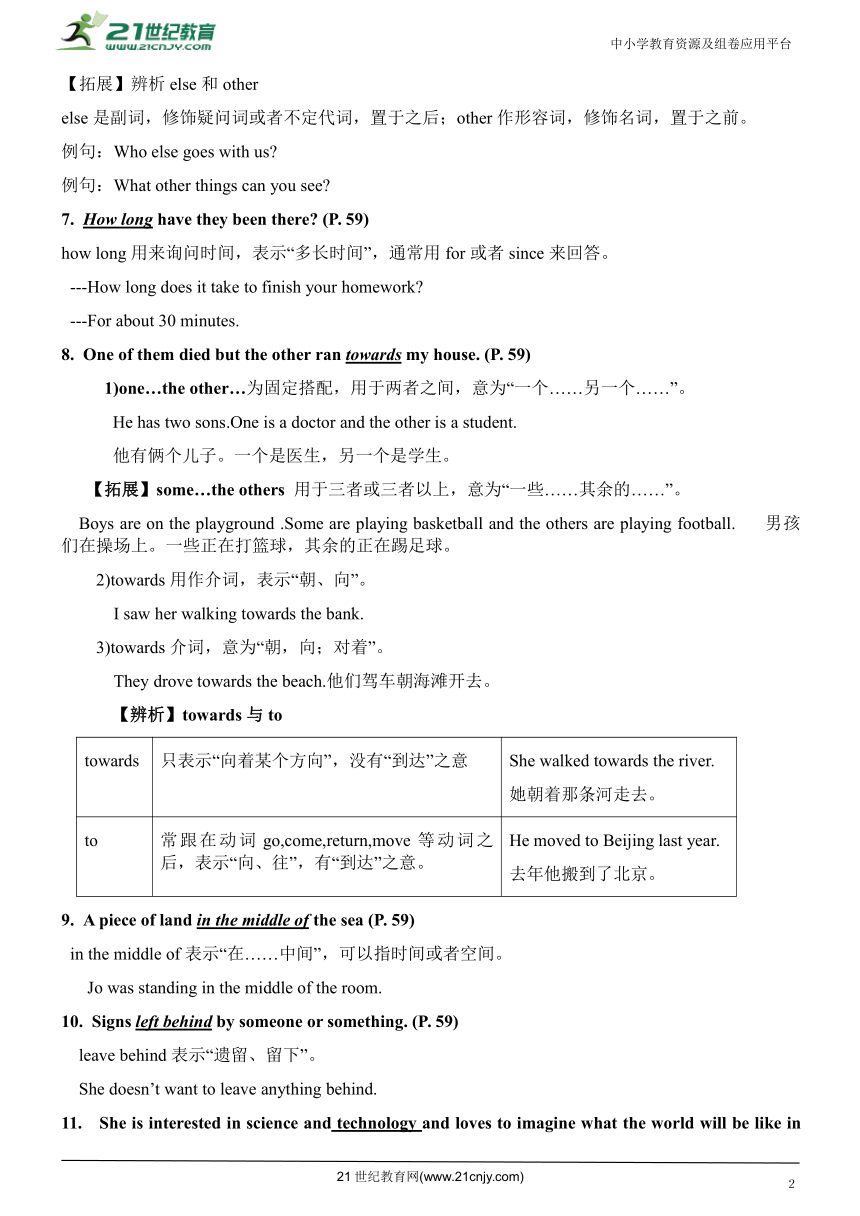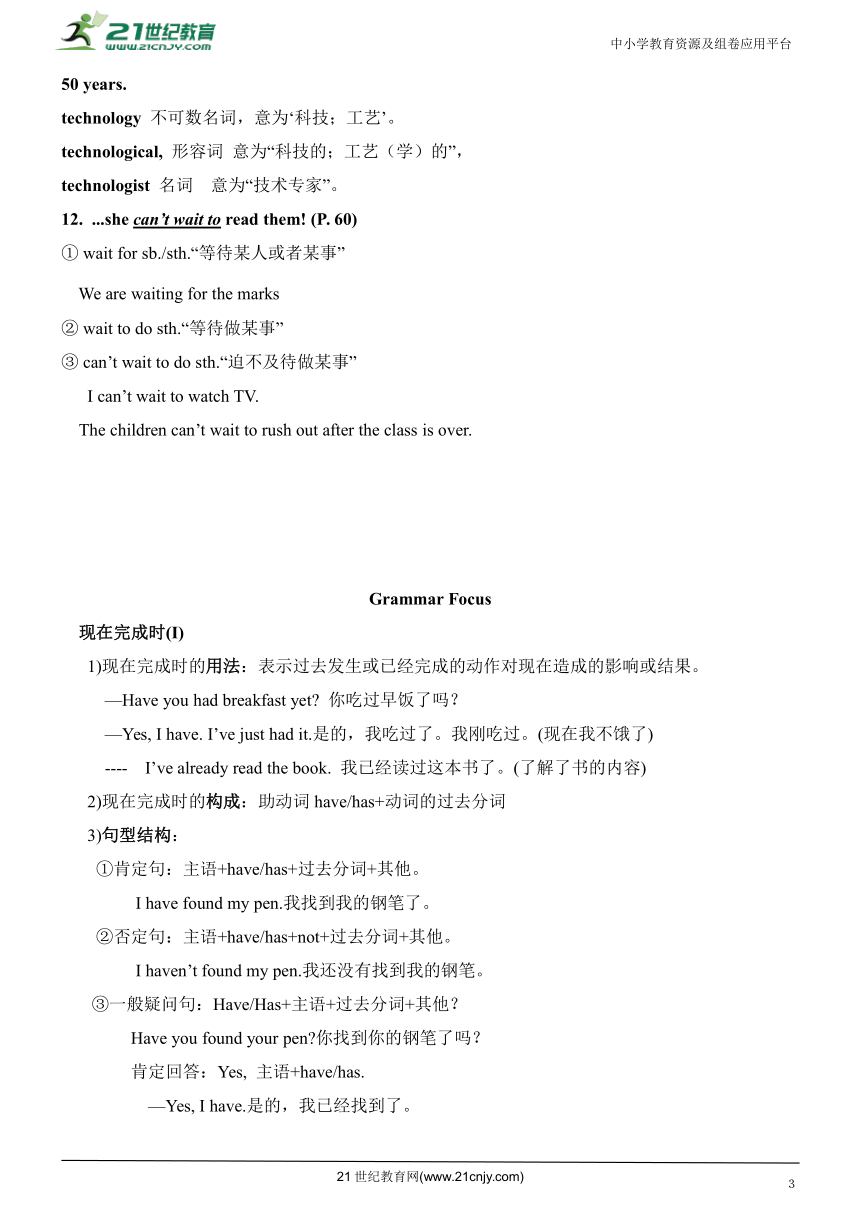Unit 8 Have you read Treasure Island yet知识点总结归纳【人教版八年级下册英语】
文档属性
| 名称 | Unit 8 Have you read Treasure Island yet知识点总结归纳【人教版八年级下册英语】 |  | |
| 格式 | docx | ||
| 文件大小 | 58.4KB | ||
| 资源类型 | 试卷 | ||
| 版本资源 | 人教新目标(Go for it)版 | ||
| 科目 | 英语 | ||
| 更新时间 | 2024-05-27 14:58:38 | ||
图片预览



文档简介
中小学教育资源及组卷应用平台
Unit 8 Have you read Treasure Island yet
Section A
Oliver Twist is about a boy who goes out to sea and finds an island full of treasures. (P. 58)
full作形容词,表示“满的、充满的、饱的、完全的”,be full of意为“充满……”,相当于be filled with。
The room is filled with people.
It is about four sisters growing up. (P. 58)
grow up表示“长大、成长”。
I want to be a football player when I grow up.
Have you at least read the back of the book to see what it’s about (P. 58)
see此处表示“明白、理解、意识到”,后接宾语从句。
I can’t see why he is unhappy.
You should hurry up. (P. 58)
hurry up意为“赶快、急忙”,in a hurry表示“匆忙地、很快地”。
Hurry up, or you will be late for school.
They went home in a hurry.
拓展】①hurry off/away 匆匆离去
Miss Zhao hurried off to look after the man. 赵老师匆匆赶去照看那个人。
②hurry用作名词,意为“匆忙;急忙”。 in a hurry 意为“匆匆忙忙”
Don’t be in a hurry 不要着急。 He went to a home in a hurry. 他急忙赶回家了。
The book report is due in two weeks. (P. 58)
due用作形容词,表示“预期、定期”,通常只用作表语。
When is the train due to arrive in Beijing
be due to do sth. 意为“预定做某事”
When is the train due in London 火车预定什么时候到达伦敦?
Her baby is due next mouth. 她的宝宝预计在下个月出生。
The guests are due to arrive very soon. 客人们很快就会到。
“in+一段时间”意为“多久之后”,常与一般将来时连用。
We will come back in one hour.
6. Who else is on my island (P. 59)
else此处是副词,意为“另外地、其它”,常置于疑问词或不定代词之后。
What else do you want
【拓展】辨析else和other
else是副词,修饰疑问词或者不定代词,置于之后;other作形容词,修饰名词,置于之前。
例句:Who else goes with us
例句:What other things can you see
How long have they been there (P. 59)
how long用来询问时间,表示“多长时间”,通常用for或者since来回答。
---How long does it take to finish your homework
---For about 30 minutes.
One of them died but the other ran towards my house. (P. 59)
1)one…the other…为固定搭配,用于两者之间,意为“一个……另一个……”。
He has two sons.One is a doctor and the other is a student.
他有俩个儿子。一个是医生,另一个是学生。
【拓展】some…the others 用于三者或三者以上,意为“一些……其余的……”。
Boys are on the playground .Some are playing basketball and the others are playing football. 男孩们在操场上。一些正在打篮球,其余的正在踢足球。
2)towards用作介词,表示“朝、向”。
I saw her walking towards the bank.
3)towards介词,意为“朝,向;对着”。
They drove towards the beach.他们驾车朝海滩开去。
【辨析】towards与to
towards 只表示“向着某个方向”,没有“到达”之意 She walked towards the river. 她朝着那条河走去。
to 常跟在动词go,come,return,move等动词之后,表示“向、往”,有“到达”之意。 He moved to Beijing last year. 去年他搬到了北京。
A piece of land in the middle of the sea (P. 59)
in the middle of表示“在……中间”,可以指时间或者空间。
Jo was standing in the middle of the room.
Signs left behind by someone or something. (P. 59)
leave behind表示“遗留、留下”。
She doesn’t want to leave anything behind.
She is interested in science and technology and loves to imagine what the world will be like in 50 years.
technology 不可数名词,意为‘科技;工艺’。
technological, 形容词 意为“科技的;工艺(学)的”,
technologist 名词 意为“技术专家”。
...she can’t wait to read them! (P. 60)
① wait for sb./sth.“等待某人或者某事”
We are waiting for the marks
② wait to do sth.“等待做某事”
③ can’t wait to do sth.“迫不及待做某事”
I can’t wait to watch TV.
The children can’t wait to rush out after the class is over.
Grammar Focus
现在完成时(I)
1)现在完成时的用法:表示过去发生或已经完成的动作对现在造成的影响或结果。
—Have you had breakfast yet 你吃过早饭了吗?
—Yes, I have. I’ve just had it.是的,我吃过了。我刚吃过。(现在我不饿了)
---- I’ve already read the book. 我已经读过这本书了。(了解了书的内容)
2)现在完成时的构成:助动词have/has+动词的过去分词
3)句型结构:
①肯定句:主语+have/has+过去分词+其他。
I have found my pen.我找到我的钢笔了。
②否定句:主语+have/has+not+过去分词+其他。
I haven’t found my pen.我还没有找到我的钢笔。
③一般疑问句:Have/Has+主语+过去分词+其他?
Have you found your pen 你找到你的钢笔了吗?
肯定回答:Yes, 主语+have/has.
—Yes, I have.是的,我已经找到了。
否定回答:No, 主语+haven’t/hasn’t.
No, I haven’t.不,我还没有找到。
【注意】① have not常简略为haven’t,has not常简略为hasn’t。
4)动词过去分词的变化规则
一般动词过去分词的构成与过去式的构成相同。不规则动词的过去分词须特殊记忆。
5)常用标志词语:
already(已经),never(从未),ever(曾经),just(刚刚),before(以前),so far(到目前为止),yet(还,已经)等。
Have you ever been to Japan 你曾经去过日本吗?
I have just finished my homework. 我刚刚完成我的家庭作业。
6)already与yet的用法:
①already与yet都有“已经”的意思,但already常用于肯定句中,放在助动词have/has之后,过去分词之前;yet常用于疑问句中,并用于句末。
I’ve already seen the film.我已经看过这部电影。
Have you seen the film yet 你已经看过这部电影了吗?
②yet用于否定句中,意为“还(没);尚(未)”,通常位于句末。
I haven’t seen the film yet. 我还未看过这部电影。
③already与yet的转换:
在现在完成时态的句子中,含有already的陈述句变为否定句或疑问句时,要把already改为yet,并放于句末。
I have already finished reading the book.我已经读完这本书了。
变为否定句:
I haven’t finished reading the book yet . 我还没有读完这本书。
变成疑问句:
Have you finished reading the book yet 你已经读完这本书了吗?
Section B
The Toms must be popular. (P. 61)
must此处表示“一定、肯定”,表示肯定的推测,否定推测用can't be“一定不”。
Sam must be nearly 90 years old now.
She came to realize how much she actually missed all of them. (P. 62)
(1) come to do sth.意为“渐渐……、终于……”,常与realize, know, like, understand等连用。
He came to know the importance of the family.
How did you come to know him.
Come to do sth 来做(从事)某事
Lily comes to help me with my English.
actually表示“事实上”,相当于in a fact或者as a matter of fact。
Actually, I don’t think I want to go out tonight.
...such as the importance of money and success, but not about belonging to a group. (P. 62)
the importance of ......的重要性
belong to意为“属于、归属”,不用于进行时态,也不能用于被动语态。
That book belong to me.
The dictionary belongs to Gina.
belong to 常与物主代词/名词所有格进行句型转换
It;s must belong to Gina=It must be Gina’s.
However, country music brings us back to the good old days when people were kind to each other and trusted one another. (P. 62)
one another意为“互相”,相当于each other。
Our sons are different from each other.
★Sarah hasn’t been to Nashville yet, but it is her dream to go there one day. (P. 62)
(1) “have/ has been to +地点名词”表示“去过某地”,表示某人的一种经历,说话时已不在那个地方,常和once, twice, never, ever等连用。当地点为副词时,则要省掉no。
---Where have you been? 你去哪儿了?
---I’ve been to the post office. 我去邮局了。(人已不在邮局)
【拓展】“have/has gone to+地点名词”表示“去了某地”,说话时某人已离开此地,在去某地的路上、已在某地或在回来的路上,所以此句型常用于第三人称,不能与时间状语once, twice, never, ever等连用,也不能和for以及since构成的短语连用。
---Where is Simon 西蒙在哪儿?
---He has gone to Australia with his family.
他和家人一起去澳大利亚了。(人已不在这儿,在去澳大利亚的路上、已在澳大利亚或从澳大利亚返回的途中)
助记 have/has been to, have/has gone to意不同,两者用法当分清。
have/has been to+地点,“曾经去过某地”行;
have/has gone to+地点,“已去某地”人无踪。
“have/has been in +地点名词”表示“在某地待过(多久)”,常与表示一段时间的状语连用。
例如:Mr. Brown has been in Shanghai for three days. 布朗先生来上海已经3天了。
We have been in China since 5 years ago. 我们自从5年前就来中国了。
How long have you been in New York 你在纽约多久了?
(2) 辨析:some day 与one day
some day 指“将来的某一天”,常用于将来时 I hope I can be a teacher some day.
one day 可以表示“将来的某一天”,作此意讲时,可与some day互换;另外它还可表示“某一天”(常用于故事的开头),常与过去时连用 We want to visit the moon one day/some day. One day, a thief was caught stealing in the shop.
I hope to see him sing live one day! (P. 62)
live此处用作副词,表示“现场直播、现场演出”。
TFBOYS is playing live in Shanghai tonight.
The number of records he has sold
【辨析】the number of与a number of
the number of …的数量 其后接复数可数名词 作主语时,谓语动词用单数形式
a number of “许多”,相当于many 作主语时,谓语动词用复数形式
Have you introduced this singer/writer to others (P. 63)
introduce vt 介绍,引见
introduce sb/sth to sb 向某人介绍某人/物
Let me introduce my friends to you.
introduce...to...表示“把……介绍给……”。
Tom introduced his good friend, Nancy, to me at his birthday party.
introduce oneself to sb 向某人做自我介绍
I will introduce myself to you.
作文
你喜欢读书吗?最近你读过哪本书?请介绍一下这本书的大致内容以及你对它的看法。不少于80词。
Different people have different hobbies. I like reading books. Books are our friends.(开篇点明自己的爱好)
Recently, I have read a book Who Moved My Cheese. The American book is a bestseller all over the world. It teaches people how to face changes in their lives. The book tells us that when facing changes in our life, like a new school or new friends, don’t be afraid. We can use these changes to make a better life.(具体介绍最近读过的一本书的内容)
I think the book is very interesting. I can find both fun and knowledge in this book. I like it very much.(综述自己的看法)
介绍你读过的一本书。Robinson Crusoe
提示:1.我是一个书迷,我读过很多书
2.我已经读了《鲁滨逊漂流记》。它是一本有趣的书。
3.Robinson Crusoe 是一个勇敢的人。年轻的时候,他梦想着在大海上航行。
4.长大以后,他在一个岛上独自生活了 28 年。他总是努力面对任何危险。
5.这个故事激励着我。
提示词: book lover, have finished , dream of sailing, live alone, encourage
A book I have read
As a book lover, I have read a lot of books. I have finished reading Robinson Crusoe. This book is very interesting.
Robinson was a brave man. When he was young, he dreamed of sailing on the sea. After he grew up, he lived on an island alone for 28 years. He always tried to face any danger.
His stories encouraged me deeply. I love Robinson.
21世纪教育网(www.21cnjy.com)
Unit 8 Have you read Treasure Island yet
Section A
Oliver Twist is about a boy who goes out to sea and finds an island full of treasures. (P. 58)
full作形容词,表示“满的、充满的、饱的、完全的”,be full of意为“充满……”,相当于be filled with。
The room is filled with people.
It is about four sisters growing up. (P. 58)
grow up表示“长大、成长”。
I want to be a football player when I grow up.
Have you at least read the back of the book to see what it’s about (P. 58)
see此处表示“明白、理解、意识到”,后接宾语从句。
I can’t see why he is unhappy.
You should hurry up. (P. 58)
hurry up意为“赶快、急忙”,in a hurry表示“匆忙地、很快地”。
Hurry up, or you will be late for school.
They went home in a hurry.
拓展】①hurry off/away 匆匆离去
Miss Zhao hurried off to look after the man. 赵老师匆匆赶去照看那个人。
②hurry用作名词,意为“匆忙;急忙”。 in a hurry 意为“匆匆忙忙”
Don’t be in a hurry 不要着急。 He went to a home in a hurry. 他急忙赶回家了。
The book report is due in two weeks. (P. 58)
due用作形容词,表示“预期、定期”,通常只用作表语。
When is the train due to arrive in Beijing
be due to do sth. 意为“预定做某事”
When is the train due in London 火车预定什么时候到达伦敦?
Her baby is due next mouth. 她的宝宝预计在下个月出生。
The guests are due to arrive very soon. 客人们很快就会到。
“in+一段时间”意为“多久之后”,常与一般将来时连用。
We will come back in one hour.
6. Who else is on my island (P. 59)
else此处是副词,意为“另外地、其它”,常置于疑问词或不定代词之后。
What else do you want
【拓展】辨析else和other
else是副词,修饰疑问词或者不定代词,置于之后;other作形容词,修饰名词,置于之前。
例句:Who else goes with us
例句:What other things can you see
How long have they been there (P. 59)
how long用来询问时间,表示“多长时间”,通常用for或者since来回答。
---How long does it take to finish your homework
---For about 30 minutes.
One of them died but the other ran towards my house. (P. 59)
1)one…the other…为固定搭配,用于两者之间,意为“一个……另一个……”。
He has two sons.One is a doctor and the other is a student.
他有俩个儿子。一个是医生,另一个是学生。
【拓展】some…the others 用于三者或三者以上,意为“一些……其余的……”。
Boys are on the playground .Some are playing basketball and the others are playing football. 男孩们在操场上。一些正在打篮球,其余的正在踢足球。
2)towards用作介词,表示“朝、向”。
I saw her walking towards the bank.
3)towards介词,意为“朝,向;对着”。
They drove towards the beach.他们驾车朝海滩开去。
【辨析】towards与to
towards 只表示“向着某个方向”,没有“到达”之意 She walked towards the river. 她朝着那条河走去。
to 常跟在动词go,come,return,move等动词之后,表示“向、往”,有“到达”之意。 He moved to Beijing last year. 去年他搬到了北京。
A piece of land in the middle of the sea (P. 59)
in the middle of表示“在……中间”,可以指时间或者空间。
Jo was standing in the middle of the room.
Signs left behind by someone or something. (P. 59)
leave behind表示“遗留、留下”。
She doesn’t want to leave anything behind.
She is interested in science and technology and loves to imagine what the world will be like in 50 years.
technology 不可数名词,意为‘科技;工艺’。
technological, 形容词 意为“科技的;工艺(学)的”,
technologist 名词 意为“技术专家”。
...she can’t wait to read them! (P. 60)
① wait for sb./sth.“等待某人或者某事”
We are waiting for the marks
② wait to do sth.“等待做某事”
③ can’t wait to do sth.“迫不及待做某事”
I can’t wait to watch TV.
The children can’t wait to rush out after the class is over.
Grammar Focus
现在完成时(I)
1)现在完成时的用法:表示过去发生或已经完成的动作对现在造成的影响或结果。
—Have you had breakfast yet 你吃过早饭了吗?
—Yes, I have. I’ve just had it.是的,我吃过了。我刚吃过。(现在我不饿了)
---- I’ve already read the book. 我已经读过这本书了。(了解了书的内容)
2)现在完成时的构成:助动词have/has+动词的过去分词
3)句型结构:
①肯定句:主语+have/has+过去分词+其他。
I have found my pen.我找到我的钢笔了。
②否定句:主语+have/has+not+过去分词+其他。
I haven’t found my pen.我还没有找到我的钢笔。
③一般疑问句:Have/Has+主语+过去分词+其他?
Have you found your pen 你找到你的钢笔了吗?
肯定回答:Yes, 主语+have/has.
—Yes, I have.是的,我已经找到了。
否定回答:No, 主语+haven’t/hasn’t.
No, I haven’t.不,我还没有找到。
【注意】① have not常简略为haven’t,has not常简略为hasn’t。
4)动词过去分词的变化规则
一般动词过去分词的构成与过去式的构成相同。不规则动词的过去分词须特殊记忆。
5)常用标志词语:
already(已经),never(从未),ever(曾经),just(刚刚),before(以前),so far(到目前为止),yet(还,已经)等。
Have you ever been to Japan 你曾经去过日本吗?
I have just finished my homework. 我刚刚完成我的家庭作业。
6)already与yet的用法:
①already与yet都有“已经”的意思,但already常用于肯定句中,放在助动词have/has之后,过去分词之前;yet常用于疑问句中,并用于句末。
I’ve already seen the film.我已经看过这部电影。
Have you seen the film yet 你已经看过这部电影了吗?
②yet用于否定句中,意为“还(没);尚(未)”,通常位于句末。
I haven’t seen the film yet. 我还未看过这部电影。
③already与yet的转换:
在现在完成时态的句子中,含有already的陈述句变为否定句或疑问句时,要把already改为yet,并放于句末。
I have already finished reading the book.我已经读完这本书了。
变为否定句:
I haven’t finished reading the book yet . 我还没有读完这本书。
变成疑问句:
Have you finished reading the book yet 你已经读完这本书了吗?
Section B
The Toms must be popular. (P. 61)
must此处表示“一定、肯定”,表示肯定的推测,否定推测用can't be“一定不”。
Sam must be nearly 90 years old now.
She came to realize how much she actually missed all of them. (P. 62)
(1) come to do sth.意为“渐渐……、终于……”,常与realize, know, like, understand等连用。
He came to know the importance of the family.
How did you come to know him.
Come to do sth 来做(从事)某事
Lily comes to help me with my English.
actually表示“事实上”,相当于in a fact或者as a matter of fact。
Actually, I don’t think I want to go out tonight.
...such as the importance of money and success, but not about belonging to a group. (P. 62)
the importance of ......的重要性
belong to意为“属于、归属”,不用于进行时态,也不能用于被动语态。
That book belong to me.
The dictionary belongs to Gina.
belong to 常与物主代词/名词所有格进行句型转换
It;s must belong to Gina=It must be Gina’s.
However, country music brings us back to the good old days when people were kind to each other and trusted one another. (P. 62)
one another意为“互相”,相当于each other。
Our sons are different from each other.
★Sarah hasn’t been to Nashville yet, but it is her dream to go there one day. (P. 62)
(1) “have/ has been to +地点名词”表示“去过某地”,表示某人的一种经历,说话时已不在那个地方,常和once, twice, never, ever等连用。当地点为副词时,则要省掉no。
---Where have you been? 你去哪儿了?
---I’ve been to the post office. 我去邮局了。(人已不在邮局)
【拓展】“have/has gone to+地点名词”表示“去了某地”,说话时某人已离开此地,在去某地的路上、已在某地或在回来的路上,所以此句型常用于第三人称,不能与时间状语once, twice, never, ever等连用,也不能和for以及since构成的短语连用。
---Where is Simon 西蒙在哪儿?
---He has gone to Australia with his family.
他和家人一起去澳大利亚了。(人已不在这儿,在去澳大利亚的路上、已在澳大利亚或从澳大利亚返回的途中)
助记 have/has been to, have/has gone to意不同,两者用法当分清。
have/has been to+地点,“曾经去过某地”行;
have/has gone to+地点,“已去某地”人无踪。
“have/has been in +地点名词”表示“在某地待过(多久)”,常与表示一段时间的状语连用。
例如:Mr. Brown has been in Shanghai for three days. 布朗先生来上海已经3天了。
We have been in China since 5 years ago. 我们自从5年前就来中国了。
How long have you been in New York 你在纽约多久了?
(2) 辨析:some day 与one day
some day 指“将来的某一天”,常用于将来时 I hope I can be a teacher some day.
one day 可以表示“将来的某一天”,作此意讲时,可与some day互换;另外它还可表示“某一天”(常用于故事的开头),常与过去时连用 We want to visit the moon one day/some day. One day, a thief was caught stealing in the shop.
I hope to see him sing live one day! (P. 62)
live此处用作副词,表示“现场直播、现场演出”。
TFBOYS is playing live in Shanghai tonight.
The number of records he has sold
【辨析】the number of与a number of
the number of …的数量 其后接复数可数名词 作主语时,谓语动词用单数形式
a number of “许多”,相当于many 作主语时,谓语动词用复数形式
Have you introduced this singer/writer to others (P. 63)
introduce vt 介绍,引见
introduce sb/sth to sb 向某人介绍某人/物
Let me introduce my friends to you.
introduce...to...表示“把……介绍给……”。
Tom introduced his good friend, Nancy, to me at his birthday party.
introduce oneself to sb 向某人做自我介绍
I will introduce myself to you.
作文
你喜欢读书吗?最近你读过哪本书?请介绍一下这本书的大致内容以及你对它的看法。不少于80词。
Different people have different hobbies. I like reading books. Books are our friends.(开篇点明自己的爱好)
Recently, I have read a book Who Moved My Cheese. The American book is a bestseller all over the world. It teaches people how to face changes in their lives. The book tells us that when facing changes in our life, like a new school or new friends, don’t be afraid. We can use these changes to make a better life.(具体介绍最近读过的一本书的内容)
I think the book is very interesting. I can find both fun and knowledge in this book. I like it very much.(综述自己的看法)
介绍你读过的一本书。Robinson Crusoe
提示:1.我是一个书迷,我读过很多书
2.我已经读了《鲁滨逊漂流记》。它是一本有趣的书。
3.Robinson Crusoe 是一个勇敢的人。年轻的时候,他梦想着在大海上航行。
4.长大以后,他在一个岛上独自生活了 28 年。他总是努力面对任何危险。
5.这个故事激励着我。
提示词: book lover, have finished , dream of sailing, live alone, encourage
A book I have read
As a book lover, I have read a lot of books. I have finished reading Robinson Crusoe. This book is very interesting.
Robinson was a brave man. When he was young, he dreamed of sailing on the sea. After he grew up, he lived on an island alone for 28 years. He always tried to face any danger.
His stories encouraged me deeply. I love Robinson.
21世纪教育网(www.21cnjy.com)
同课章节目录
- Unit 1 What's the matter?
- Section A
- Section B
- Unit 2 I'll help to clean up the city parks.
- Section A
- Section B
- Unit 3 Could you please clean your room?
- Section A
- Section B
- Unit 4 Why don't you talk to your parents?
- Section A
- Section B
- Unit 5 What were you doing when the rainstorm came
- Section A
- Section B
- Review of Units 1-5
- Unit 6 An old man tried to move the mountains.
- Section A
- Section B
- Unit 7 What's the highest mountain in the world?
- Section A
- Section B
- Unit 8 Have you read Treasure Island yet?
- Section A
- Section B
- Unit 9 Have you ever been to a museum?
- Section A
- Section B
- Unit 10 I've had this bike for three years.
- Section A
- Section B
